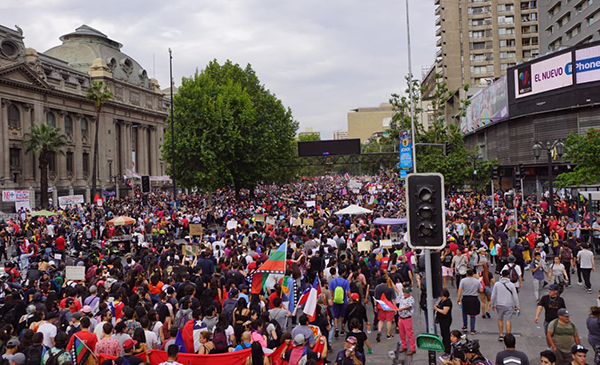Chile: In the Face of Violent Government Repression, Mass Protests Force President to Oust Cabinet and Lift Curfew
| revcom.us
On Friday, October 25, more than a million people took over the streets of Santiago—the capital of Chile—against the government of President Sebastián Piñera. This was more than five percent of the country’s entire population. There were also large protests in Valparaíso (100,000 people) and other cities across Chile. These are a continuation and intensification of protests that began in early October.
The Friday mobilization brought the capital to a standstill as people marched for miles. According to an Al Jazeera report, “People of all ages and classes joined together to the beat of pans and drums. Music groups started impromptu concerts in different areas of streets, squeezed between thousands of other demonstrators dancing and jumping in union.” There were a lot of students and youths, indigenous peoples, feminists, migrants, workers, and others. There were chants of “Oh, Chile despertó” (“Chile woke up”)—a declaration that people were waking up and rising up after years of repression and increasing inequality and poverty for large sections of Chilean masses in the decades after the rule of Pinochet, who came to power in a U.S.-backed coup in 1973.1
Some slogans seen on posters: “This is Chile’s spring”... “Under democracy, they torture, brutalize, rape, and kill us”... “Piñechet” (comparing current President Piñera to Pinochet). There were calls for the resignation of Piñera, for a new and just government, a new constitution, higher wages, etc. At one point, thousands of protesters joined together to sing a song by Victor Jara—the much-loved musician who was rounded up, along with thousands of others, by Pinochet’s troops during the 1973 coup and held in a Santiago stadium, where he was tortured and had his hands broken before being murdered.
The protests began in early October when high school students took to the streets against an increase in public transportation fares. The protests escalated, including the burning of subway stations—getting so out of control of the riot police and then the army forces that replaced them that the authorities had to shut down the subway system right at the end of rush hour. In the face of reactionary violence from the police and the military, the protests have gotten broader and more massive. As of October 27, according to official reports, 20 people have been killed in the demonstrations, and 16 reports have been filed with the human rights commission, the latest in relation to torture and sexual violence against a gay youth by the riot police. And there have been over 7,000 arrests.
Chile is one of Latin America’s wealthiest countries—and at the same time, it has one of the highest levels of inequality among “developed” countries. More than 35 percent of the urban population lives in extreme poverty. This has taken place under the domination of U.S. imperialism. The demands of the protests include reducing cost of medicines, easing the heavy debt many people are burdened with, decent pensions and wages, reducing public transportation and other costs of living, and changes in the overall economy that were brought in under Pinochet’s military regime (and continue today), like the near total privatization of health care and education.
As of this writing, the protests have forced the government to lift the curfew in Santiago and the state of emergency throughout Chile at midnight, Sunday, October 27. In the interior of Chile, military-imposed curfews still continue in 12 regions. Piñera announced that he was dismissing his whole cabinet—a move reflecting the seriousness of the crisis for Chile’s rulers who face an urgent need to try to quiet down the mass protests.
The next mass mobilization has been called for Tuesday, October 29. Stay tuned.
1. See the installment “The 1973 CIA Coup in Chile” in the revcom.us series American Crime. [back]

One million people flood the streets of Santiago, Chile, in protest against the government, October 25. Photo: @PiensaPrensa
Wow! #Chile: Right now, a multitudinous march towards a demonstration in the city of #Valparaiso.
— ubique (@PersonalEscrito) October 27, 2019
Video: @her_trini via @DrZapajoint #EstoNoHaTerminadoً #Constitucion2020 pic.twitter.com/24LCed5CHz
Get a free email subscription to revcom.us:

